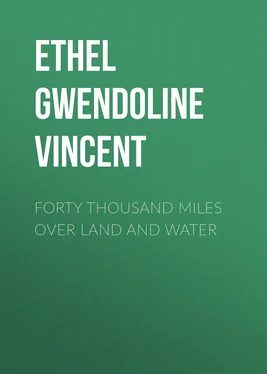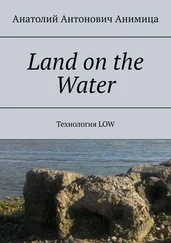Ethel Vincent - Forty Thousand Miles Over Land and Water
Здесь есть возможность читать онлайн «Ethel Vincent - Forty Thousand Miles Over Land and Water» — ознакомительный отрывок электронной книги совершенно бесплатно, а после прочтения отрывка купить полную версию. В некоторых случаях можно слушать аудио, скачать через торрент в формате fb2 и присутствует краткое содержание. Жанр: Путешествия и география, foreign_antique, foreign_prose, на английском языке. Описание произведения, (предисловие) а так же отзывы посетителей доступны на портале библиотеки ЛибКат.
- Название:Forty Thousand Miles Over Land and Water
- Автор:
- Жанр:
- Год:неизвестен
- ISBN:нет данных
- Рейтинг книги:3 / 5. Голосов: 1
-
Избранное:Добавить в избранное
- Отзывы:
-
Ваша оценка:
- 60
- 1
- 2
- 3
- 4
- 5
Forty Thousand Miles Over Land and Water: краткое содержание, описание и аннотация
Предлагаем к чтению аннотацию, описание, краткое содержание или предисловие (зависит от того, что написал сам автор книги «Forty Thousand Miles Over Land and Water»). Если вы не нашли необходимую информацию о книге — напишите в комментариях, мы постараемся отыскать её.
Forty Thousand Miles Over Land and Water — читать онлайн ознакомительный отрывок
Ниже представлен текст книги, разбитый по страницам. Система сохранения места последней прочитанной страницы, позволяет с удобством читать онлайн бесплатно книгу «Forty Thousand Miles Over Land and Water», без необходимости каждый раз заново искать на чём Вы остановились. Поставьте закладку, и сможете в любой момент перейти на страницу, на которой закончили чтение.
Интервал:
Закладка:
Ottawa, other than the Parliament buildings, which are alone worth coming to see, is the dullest and most primitive of towns. C. was, however, glad to have been there, as it gave him the opportunity of meeting the Ministers of Inland Revenue, and Agriculture, and other authorities, and hearing their views on the rapid development of Canada.
Returning to Montreal, we took the night boat to Quebec. A golden, glorious sunset, sinking behind purple clouds, was reflected in the water, and this was succeeded by a trail of silver light from the newly-risen crescent moon.
Tuesday, July 29th. —At 7 a.m. on a cloudy morning, from the deck of the steamer we were looking up at Quebec, perched, Gibraltar like, on an inaccessible promontory of precipitous rock, formed by the junction of the River St. Charles with the St. Lawrence.
The narrow streets of the lower town, with their picturesque red-tiled roofs and overhanging gables, seem at first sight as if they were entirely cut off from the upper town by a shelving mass of rocks.
However, we were soon wending our way upwards by a street so steep that it could only be likened to climbing a mountain. The houses on either side seemed also to be climbing the roof of the houses above, the upper storey being on a level with the second floor of its neighbour. Any sand there ever has been was long ago washed down by the rain, leaving a stony surface as a precarious foothold for the poor struggling horses. This was the more circuitous route for carriages. A nearer one for pedestrians lay in the perpendicular flight of steps cut out in the face of the rocks leading immediately to Dufferin Terrace. This terrace was called after Lord Dufferin, the most popular of Governors-General, and is built on the old buttresses and platform formerly occupied by the Château of St. Louis. It is a favourite resort of the townspeople, perhaps as being the only level ground, so far as we could see in the town, but probably more so on account of the beautiful view it commands over the river. Vessels of all classes and sizes, coming from all parts of the world, but more especially from England, were anchoring in the broad basin formed by the confluence of the two rivers. Immediately beneath us were the wharves of the old town, where we could see two or three colliers discharging coal, and even hear in the still morning air the rattling of the chains as the crane was swung to and fro. On the opposite side rose the fortified bluff of Point Levy, and on the other the St. Charles winding away up its peaceful valley. The white houses of Beaufort form a straggling line almost as far as the Montmorenci Falls, which latter seem only a speck in the distance. There was a light morning mist floating away over the opposite heights, and the murmur of the busy hum of life reached us from below.
The Governor's garden, facing the road on the opposite side, is only an enclosure overgrown with rank weeds and grass, but it contains the obelisk erected to the joint memory of Wolfe and Montcalm. It is a novel idea to combine the names of the victorious and conquered, but it shows a true appreciation of the two generals who each gave up their life for their country in the hour of battle. In the Ursuline Convent, near by, we see Montcalm's grave, said to have been made by the bursting of one of the enemy's shells during the bombardment, with the inscription in French—
There are some very quaint old buildings and curious bits of architecture in out-of-the-way corners, and the town altogether has an old-world look, as if life were passing it by. The outside of the Catholic Cathedral is homely and irregular, and very damp and musty inside; but attached to one of the pillars is a fine "Crucifixion" by Van Dyke; and the adjoining seminary has quite a large collection of pictures highly prized by the inhabitants, though by artists unknown to fame. The Laval University, chartered by the Queen in 1852, is the most modern building in Quebec.
The population is almost entirely French, and the maintenance of their language and institutions was guaranteed to them at the conquest. Descendants of the old noblesse still linger here, preserving among themselves the traditions of their forefathers in a circle of society renowned for its polish and refinement; preserving, too, in its entirety the purity of the mother language. They do not mix at all with the English.
The Citadel is gloriously situated on the high ground above the town, surrounded by walls and ramparts, but our approach to it was under the following untoward circumstances. We hired an ungainly cabriolet, a vehicle on two wheels, with a narrow board in front, on which the driver—a raw-boned Irish boy in our case—driving a sorry steed, was seated. After going up a very steep hill, the entrance to the fortress is over a wooden drawbridge guarded by massive chain gates. The hollow sound of the wood frightened the horse beyond control, and we discovered then that he could go, when he turned and bolted down the hill. We only prevented ourselves from being pitched out head-foremost by clinging on to the sides of the old-fashioned hood. The driver was powerless, and C. eventually stooped over and jerked the reins happily with success. We must have caused much amusement to the soldiers looking out from the guard-house window.
The Governor-General's residence is part of the low stone building in the courtyard, the remainder of the Citadel being used for barracks; the windows on the river side command a superb view.
In the absence of Lord Lansdowne, Lord and Lady Melgund entertained us most hospitably, and very kindly took us on the river in the police launch after luncheon, near enough to obtain a good view of the beautiful Montmorenci Falls. The volume of water is powerful in the first instance, but dwindles into fringes, and evaporates altogether in mist at the base.
A storm was gathering on the heights as we returned, and a dense bank of fog rolled down the river. The thunder muttered overhead, and a rift in the clouds let a curious light stream over the roofs of the town; and then, closing up, the black cloud swept towards us, creeping up Diamond Cape, till the Citadel above loomed out white and ghostly from the surrounding clearness. In a downpour of tropical rain we reached the wharf.
We should liked to have managed an expedition from Quebec to the beautiful Saguenay River, combining a visit to Sir John Macdonald, the present Premier; but that great Nemesis, time, was already beginning to pursue us. We left Quebec the next morning, passing again through Montreal at five in the afternoon, and sleeping at Plattsburg, on the shores of Lake Champlain.
It was a great disappointment to us not to be able to see more of Canada, but we shall hope to pay it a more extended visit on some future occasion. It offers as great attractions to the lover of nature as to the sportsman, and affords a glorious and unlimited field for the emigration of men and women since the opening up of the Far West by the Canadian Pacific Railway.
CHAPTER IV
THE AMERICAN LAKES, AND THE CENTRES OF LEARNING, FASHION, AND GOVERNMENT
Thursday, July 31st. —Up at 6 a.m. this morning to catch the steamer. However early we rise for these matutinal starts there is always a rush in the end to catch the train or boat. It is a depressing thought when we think of what frequent occurrence they will be for the next few months.
We were soon plying our way over the placid bosom of Lake Champlain, holding a central course. The shores on either side are flat and ugly, for the beauty of the lake lies in the broad expanse of unruffled waters reflecting the various changes of the sky, generally of a heavenly blue, but on this morning taking the leaden hue of the low-lying clouds.
Читать дальшеИнтервал:
Закладка:
Похожие книги на «Forty Thousand Miles Over Land and Water»
Представляем Вашему вниманию похожие книги на «Forty Thousand Miles Over Land and Water» списком для выбора. Мы отобрали схожую по названию и смыслу литературу в надежде предоставить читателям больше вариантов отыскать новые, интересные, ещё непрочитанные произведения.
Обсуждение, отзывы о книге «Forty Thousand Miles Over Land and Water» и просто собственные мнения читателей. Оставьте ваши комментарии, напишите, что Вы думаете о произведении, его смысле или главных героях. Укажите что конкретно понравилось, а что нет, и почему Вы так считаете.












